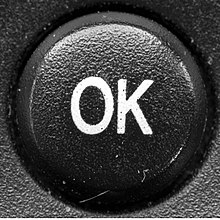
"OK" (/oʊkeɪ/; also spelled "okay", "ok") denotes approval, acceptance, agreement, assent, or acknowledgment. "OK", as an adjective, can also express acknowledgment without approval. "OK" has frequently turned up as a loanword in many other languages.
As an adjective, "OK" means "adequate", "acceptable" ("this is OK to send out"), "mediocre" often in contrast to "good" ("the food was OK"); it also functions as an adverb in this sense. As an interjection, it can denote compliance ("OK, I will do that"), or agreement ("OK, that is fine"). As a verb and noun it means "assent" ("the boss OKed t...